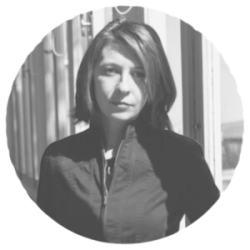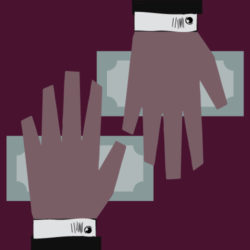How not to interview a war criminal
In a masterclass on how not to interview a genocidal war criminal, Vice News traveled to Moscow to sit down for an exclusive with Maria Lvova-Belova, Russian President Vladimir Putin’s commissioner for children’s rights. The International Criminal Court has issued warrants on March 17 for the arrests of Lvova-Belova and her boss Vladimir Putin, who are charged with committing the war crime of illegally deporting and transferring children from Ukraine to Russia. Just last week the Parliamentary Assembly of the Council of Europe recognized the deportation of Ukrainian children to Russia as genocide and “welcomed” the warrants issued for Putin and Lvova-Belova.
An interview with Lvova-Belova is a legitimate journalistic enterprise but there should have been red flags the moment the Russian government agreed to make her available to Vice. The Russian government has massively cracked down on independent journalists, recently jailing Evan Gershkovich, a Wall Street Journal correspondent. Why was it so willing to allow Vice to speak to Lvova-Belova? Did the Kremlin anticipate that she would be allowed to make her case to a Western audience? What could have been a unique opportunity for Vice to challenge Lvova-Belova became instead a platform for an alleged war criminal and an example of how journalism can be used as a tool of disinformation.
“Are you a war criminal?” is the opening question of the interview. Lvova-Belova laughs. “That’s very funny,” she says. “I am a mother.” Dressed in white, 38-year-old Lvova-Belova is given the space she needs to dismiss every allegation against her. She comes across as polite, reasonable and driven, first and foremost, by her motherly instincts. She is after all a mother to 23 children, 18 of them adopted, including a teenage boy from Mariupol who she adopted in November 2022.
In keeping with her self-image, her voice is steely as she talks about how little Ukraine did to safeguard Ukrainian children. And she smiles as she talks about her own “love” for Ukrainian children, including the boy she adopted. Throughout the interview, she is permitted to position herself exactly as the Kremlin state media portrays her — a passionate humanitarian concerned about children’s rights. When Lvova-Belova tells Vice that Ukraine did not arrange humanitarian corridors from Mariupol, the reporter replies that “Ukraine disputes this claim,” missing an opportunity to remind Lvova-Belova — and Vice viewers — that Ukraine couldn’t establish any humanitarian corridors because Russia was relentlessly bombing civilian targets.
In another example, footage is shown of Ukrainian children being wheeled out onto a stage to thank Russian soldiers for “saving hundreds of thousands of children in Mariupol” in front of a crowd of cheering Putin supporters in Moscow’s vast Luzhniki stadium. The Vice reporter asks: “Are these children being used as propaganda tools by the Russian state?” Employing her most reasonable tone, Lvova-Belova says the children were thanking the soldiers for “evacuating” them from a war zone. “Since when,” she asks unchallenged, “do words of gratitude constitute propaganda?”
The interview is an extraordinary example of how the right mix of naivety and complacency can turn a well-intentioned journalist into a messenger for an authoritarian state. Good journalism challenges lies with facts, presents information in context and, yes, listens to all sides but not uncritically. The Vice report fails on all of these fronts. Lvova-Belova’s lies go largely uncontested. Context is scarce. And the Ukrainian side is gestured at but isn’t called on to speak for itself. Vice was also loose with the facts. In a throwaway line in the text that accompanied the video interview, Vice accepted that Crimea was a part of Russia. It later issued a correction, acknowledging that “Crimea is internationally recognised as part of Ukraine.”
Isobel Yeung, the Vice interviewer, in a tweet promoting the interview with Lvova-Belova, wrote: “We feel it’s important to hold the powerful to account.” It is. Yeung did well to secure the interview. But even making allowances for the fact that Russia is not a comfortable place right now to visit as a journalist, what Yeung failed to do was to hold Lvova-Belova to account. Instead, Vice, which coincidentally is also headed for bankruptcy after years of mismanagement and scandals, gave her and the Kremlin a platform to spin and legitimize their narrative.
WHAT WE ARE WATCHING:
- Dmitry Kiselyov, Putin’s propaganda tsar, is very upset about the fate of Tucker Carlson. In his latest show, watched by millions across Russia, he asked who would “clean up America’s transgender garbage now?” Carlson has been a darling of Russian state media and his firing, according to Kiselyov, was “an example of cancel culture.” According to Kiselyov, Tucker was canceled for his attempts to save the United States from cruelty, greed and cowardice.
- As Sudan enters its third week of fighting, there is increasing evidence that the Russian mercenary group Wagner has been supplying Sudan’s Rapid Support Forces with missiles to aid their fight against the country’s army, according to CNN. But this nuanced discussion from the International Crisis Group on the situation in Sudan injects some healthy skepticism about Wagner’s possible role in the conflict.
- South Africa is pushing for a “virtual” Putin visit to solve the International Criminal Court arrest warrant dilemma. Moscow and Pretoria are engaged in high-level talks that could see Putin avoid traveling to South Africa to avert a diplomatic fallout over the warrant.
- Ukraine’s President Volodymyr Zelenskyy and China’s President Xi Jinping finally had their long-awaited telephone call. China will be sending a special envoy to Ukraine in an effort to step up Beijing’s role as a “peace broker.” We covered Xi’s visit to Moscow earlier in the spring and explained why so many Ukraine watchers are skeptical about Beijing’s vague 12-point peace plan. This Global Times editorial, though, argues that China can provide a path to peace “full of Eastern wisdom.”
And before we wrap up for today, make sure to read and tweet:
- Coda’s Amanda Coakley, reporting from Ukraine, as she explores how the LGBTQ rights debate is testing the country’s commitment to Europe.
- This thought-provoking piece by Alexander Wells on Australia’s search for national identity in the trenches of WWI and the warning Australian memory culture offers for the United States.
- This poignant letter by Financial Times journalist Polina Ivanova to her friend Evan Gershkovich in a Russian jail.







